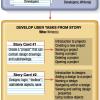|
|
Developing Your Professional Network Do you shudder at the thought of having to learn social etiquette in order to manage your professional network? Networking rituals do have to evolve to fit with new communication mechanisms. But the workings of the human psyche haven't changed, and you still need to learn the skills that are necessary to develop a network that can bolster your career.
|
|
|
|
The Power Loss Trap In order to be effective, Testing must co-exist on a level playing field with Development and Project Management. It cannot be subservient to them. A test lead's authority on a project springs from his or her projected sense of self-confidence in the role, and the Power Loss Trap undermines this authority. Here are a few commonsense ways to protect yourself.
|
|
|
|
Beyond Belief Technical Editor Esther Derby talks about how unconscious beliefs, filters, and maps influence the way we react to situations and the conclusions we reach.
|
|
|
|
On the Cost of Quality Technical Editor Brian Lawrence explains four types of costs of quality: prevention, appraisal, internal failure, and external failure.
|
|
|
|
My Next Mission (And How You Might Benefit from It) Technical Editor Brian Marick proposes organizing a public effort to test a real software product.
|
|
 |
EXtreme Documentation The kind of collaboration that Extreme Programming engenders can benefit both publications and development. Writing, like programming, is a naturally iterative, revisionary process. Dana De Witt Luther shares what she's learned about documenting an Extreme Programming project, using iterative planning meetings and story cards.
|
|
|
|
Interesting Times Technical Editor Brian Lawrence offers some troubling trends he sees in the world of software development and testing, including software produced in "Web Time" and mainline business functions being moved onto Web-based systems.
|
|
|
|
When Your Manager Is No Techie It's a pretty good bet that at some point in your career you and your work will be managed by someone who doesn't really understand what you do. Here are some ways to close the communication gap when you have a nontechnical manager.
|
|
|
|
Measuring Up You measure because you want to make better-informed decisions. But even simple, harmless-looking measures can be dangerous. For example, they can give you a nice, clear picture of an illusion. Do you want to base your decisions on illusions? Technical Editor Brian Lawrence advises that, before you dive into measuring anything, ask yourself, "Will measuring do more harm than good?"
|
|
|
|
(Management) Process Improvement Few people know intuitively how to manage process, projects, and people. Like anyone else learning a new skill, new managers need training, guidance, and mentoring. And just like technical staff, experienced managers need to keep their skills current and evolve with an evolving workplace. Technical Editor Esther Derby gives advice on how to develop your management abilities.
|
|
